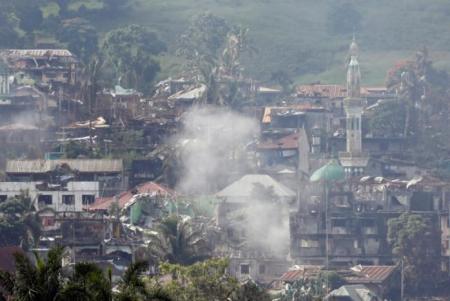ISIS Militants in Philippines Targeted Christians for Worst Abuse: Report

Dozens of Christian civilians were killed while others in the community bore the brunt of the six-month conflict on the southern Philippine island of Mindanao between the country's military and militants allied to the Islamic State group, which ended last month, according to a detailed report by Amnesty International.
During the conflict, from May to October, "militants regularly targeted civilians and carried out numerous extrajudicial executions. The civilian victims were nearly all Christians, and most – if not all – were targeted because they were not Muslim," says the report, "The Battle of Marawi': Death and Destruction in the Philippines."
Marawi is a city of 200,000 on the island of Mindanao in the Southeast Asian Catholic-majority country. The conflict began in May, as about 200 people, many of them Christian, were taken hostage in the city after hundreds of militants seized commercial buildings, mosques and houses in the predominantly Muslim city. The entire island of Mindanao was placed under military rule after the siege, and the United States government supported the Philippines for counterterror efforts.
"Militants often executed Christians at de facto checkpoints, which the Christians were approaching in order to exit the city," the report says. "Militants usually performed the killings with a pistol, a rifle, or by cutting the victim's throat. Journalists have reported cases where civilians were beheaded. Most victims were shot and killed immediately after being questioned by the military. Most victims were shot and killed while standing or kneeling on the ground; some were shot and killed while running away."
The U.K.-based human rights group says it interviewed 11 individuals who witnessed 10 separate incidents where militants unlawfully killed one or more civilians. "In total, witnesses provided Amnesty International with accounts of 25 civilian deaths. Unlawful killings by militants have also been reported in the media."
On 24 May, a witness, identified as Hassan, a driver and shop-owner, witnessed militants kill six people by cutting their throats. The victims were Christian carpenters. "I was in Banggolo market [making a delivery], when I saw six men lying face down on the ground. It was very awful. [The militants] stepped on their heads and they grabbed their hair and then they shot them. … After they shot them, [the militants] started shooting in the air."
Another witness, identified as Adam, told the group that he witnessed a killing near the parking lot of the Amai Pakpak Medical Hospital on May 23, when three militants dressed all in black approached and blocked an ambulance. "I saw them stop the ambulance," he said. "They asked [the driver] to say the Shahada (an Islamic creed declaring belief in the oneness of God and the acceptance of Muhammad as God's prophet), but the driver was not able to answer so they shot him. ... Then they came to me and asked me to recite the Shahada [and I did], and they let me live."
During the initial days of the conflict, the vast majority of the civilian population evacuated from Marawi, but several Christians were targeted by militants and killed while trying to evacuate.
"The intentions of the militants – who appeared to be monitoring the exodus to single out non-Muslims to capture or kill – quickly became known to residents and visiting workers. Many Muslim residents helped Christians to evacuate by escorting them out of the city in their vehicles, disguising them in traditional Muslim clothing, or persuading militants that the Christians were Muslim."
Military spokesman Jo-Ar Herrera earlier said that Christian hostages were being kept as sex slaves and as human shields. "This is what is happening inside, this is very evident," Herrera said in June. "These are evil personalities."





















